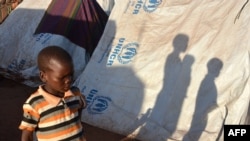The U.N. refugee agency, UNHCR, for the first time scaled back Tuesday’s commemoration of World Refugee Day in Malawi after refugees called out the tough living conditions there. Malawi authorities have been forcibly relocating refugees into the Dzaleka refugee camp, where refugees say there is inadequate shelter, food, and clean water.
In previous years in Malawi, the day typically was marked by holding a special event with activities like dance presentations, displays from refugees and speeches from government and U.N. officials.
The theme for this year’s observance is “hope away from home.”
It comes at a time, however, when the Malawi government is forcibly relocating refugees who stay outside Dzaleka, the country’s only refugee camp.
UNHCR and several rights advocates, including Human Rights Watch, have requested that the government halt the forced relocations after refugees complained of the dehumanizing manner in which they were being evicted from their homes and businesses.
Niyibigira Goreth, the leader of refugees from Burundi at the Dzaleka refugee camp, told VOA the refugees’ community leaders have agreed that holding an event to observe World Refugee Day in Malawi would be an insult to refugees.
“The situation now is bad,” said Goreth. “We don’t have enough water. People are lacking water for everything because you know water is life. Many of us don’t have a place to sleep, we don’t have food. And now, for those children who are going to schools, we don’t have hope that those children will go to school this coming year because we don’t have enough classrooms.”
Goreth said this year’s theme for the World Refugee Day, “hope away from home,” does not resonate amid the congestion at the Dzaleka camp and harsh conditions refugees are facing in Malawi.
The Malawi government so far has forcibly relocated nearly 2,000 refugees to the overcrowded camp that hosts upwards of 50,000 refugees against a recommended capacity of 12,000 people. Six thousand more are targeted for relocation.
Hilda Kausiwa, senior administration and operations officer for the Department of Refugees in Malawi, said the relocation exercise is in line with Malawi's legislation, which prohibits refugees from staying outside the refugee camp.
Kausiwa said it is wrong to say that refugees have no hope in Malawi.
“Malawi has always been open to protecting and assisting refugees, but it can only do that in accordance with existing laws,” Kausiwa said. “So, if others feel that there is no hope, everyone has a choice to seek asylum where they desire, then they have power to actually decide. We are providing options for voluntary repatriations. The government will assist anyone who wants to leave, and they can always do so and seek it elsewhere.”
Kenyi Emanuel Lukajo, the associate external relations and reporting officer for UNHCR in Malawi, said they observed the day in a low-key way in respect of the decision made by refugees.
“I can say it’s a regret but also it [is the] best way to do it given the position of community leaders,” Lukajo said. “Their position is ‘we are not doing it.’ It’s something they feel is [the] right thing to do. We cannot impose that this should happen, but it’s their decision and also it’s being accountable to the affected people because we cannot do anything without their participation.”
In a statement on the commemoration of the Word Refugee Day released Tuesday, UNHCR said the day was observed in a world that often prevents refugees from accessing services and jobs they need to be self-reliant.
The U.N.’s refugee agency said no matter how long refugees remain in exile, they want to carry on with their lives.




